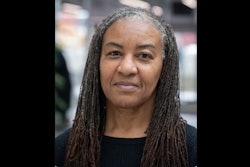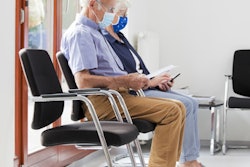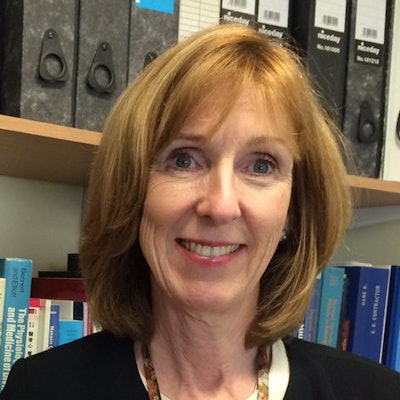
The most important personal attributes for a researcher are being committed and intellectually able, understanding the amount of work involved, establishing a strong track record, and performing well in audits, according to Prof. Fiona Gilbert, head of radiology at the University of Cambridge, U.K.
The main day-to-day challenge is often about balancing the clinical pressures with the research effort, she said in episode five (Looking forward) of CRASH! -- Clinical Radiology Academics Speaking Honestly, a series of free podcasts from the Royal College of Radiologists (RCR).
"If we have funding from, say, a charitable body, then we have an obligation to deliver the research, which is equally as important as the clinical service. But it's very, very hard when a patient is in front of you and you think you've got to go off and do this research meeting now," said Gilbert, whose research interests are breast and oncology imaging, particularly MRI.
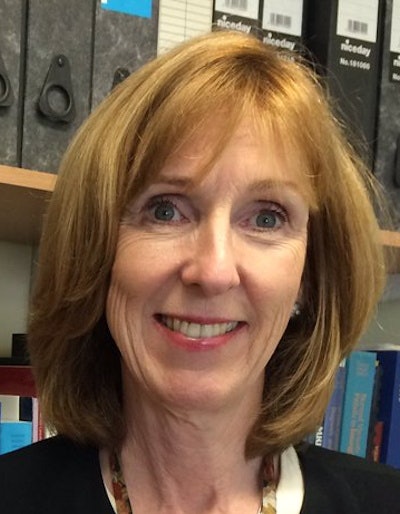 Dr. Fiona Gilbert. Photo courtesy of RCR.
Dr. Fiona Gilbert. Photo courtesy of RCR.Another major challenge is the complex regulatory hurdles, which can result in enormous delays in getting research started. The Health Research Authority (an executive nondepartmental public body of the U.K. Department of Health) works hard to resolve problems, move things along, and speed up ethical approval, but the delays now occur at the local research and development point. This means that researchers may face a six-week delay before even submitting an application, even though it may go through a bit quicker.
"I still think it's extraordinarily frustrating and wasteful of public money," commented Gilbert, who is also an honorary consultant radiologist at Addenbrooke's Hospital in Cambridge. "The research department is often overwhelmed with studies, and they have a changing field of regulations they have to keep up with."
She believes there should be a more proportionate approach to the regulatory hurdles that are currently faced and a "light-touch approach" could be considered in some low-risk studies.
"The paperwork that is involved is just huge, and it's the most off-putting aspect of research," she continued. "Unless you are part of an infrastructure that has all the necessary people to help and support you, I think it's almost impossible to get started."
Leaders of a research project must still be involved in the clinical side to ensure protocols have been set up in the right way, noted Gilbert. Even so, dealing with people within the research field can be problematic, especially when research integrity is involved, and the challenge is to know how to deal with that in a compassionate way. This often takes time and requires the support of others.
"We should push the RCR to try to encourage all radiology trainees take part in a research project during their training. I think that would make a huge difference," she said. "To improve our research output in the U.K., we need to start with the medical students and try to ensure that anatomy teaching is done by radiologists."
When asked what keeps her awake at night, she replied, "Not delivering on a grant, not recruiting to posts, problems within the team, and if things aren't gelling in the department; if there's infighting, I worry about how I'm going to sort that out, how I'm going to settle it down."
Gilbert's article on leadership -- "Ten lessons of leadership: reflections of a female academic" -- was published online by Clinical Radiology on 11 August 2020.
Research brings benefits
Research-active clinicians remain much more interested in the world they are working in, and they give a lot back to their employers, Dr. Erika Denton, consultant radiologist and medical director at the Norfolk and Norwich University Hospital (NNUH), noted in the same RCR podcast.
"Research is absolutely fundamental and at the heart of decision-making, so it's important to promote it," she said. "The evidence says that research-active hospitals deliver better care; there are complex reasons for this, and it isn't just because they recruit the brightest and the best teams where people want to work in places with intellectual challenge and prestige ... if you have a really research-active environment, people are intellectually curious and therefore intellectually more challenging of each other as well and that results in better health care."
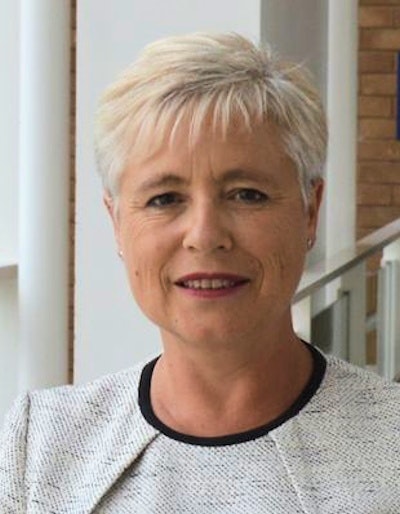 Dr. Erika Denton. Photo courtesy of Norfolk and Norwich University Hospital.
Dr. Erika Denton. Photo courtesy of Norfolk and Norwich University Hospital.To succeed, researchers need the tenacity be a completer/finisher, and they must know when to ask for help, especially if something cannot be completed. "Admit you don't know sometimes, and collaboration is everything. Be skilled and eloquent in the written word. Share what you know works."
Research also helps people use different parts of their brains, but a lot of the work seem quite dull and boring, such as obtaining funding for research assistants, said Denton, who is honorary professor of radiology at the University of East Anglia. Her own area of research is breast imaging, including artificial intelligence.
Often, when people get to the level of a consultant or senior doctor and have a full-on job, they lose their interest in research and don't set aside the necessary time.
"Unfortunately, a lot of people's brilliant research is often switched off because they are in an environment where they don't feel they can continue -- especially young consultants who are struggling and juggling with multiple calls on their time such as young families and busy clinical careers," said Denton, adding that it's essential to create a research-friendly environment and the right infrastructure within hospitals to allow people to do research, build teams, and create relationships.
Consent problems
Conducting research on children is particularly difficult due to patient consent and assent issues, as well as problems with designing protocols and writing studies, noted Prof. Amaka Offiah, PhD, chair of pediatric musculoskeletal imaging at the University of Sheffield, in the RCR podcast.
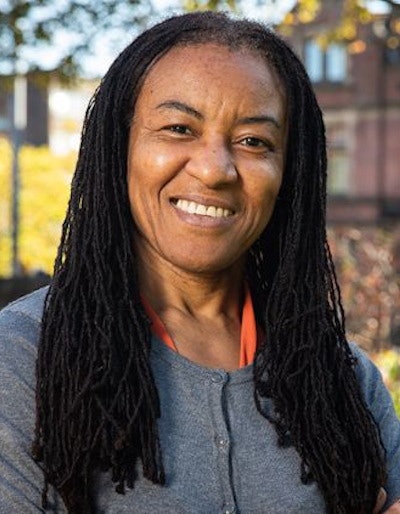 Prof. Amaka Offiah, PhD. Photo courtesy of University of Sheffield.
Prof. Amaka Offiah, PhD. Photo courtesy of University of Sheffield.Her research interests include imaging of suspected child abuse and skeletal dysplasia, and she focuses much of her effort on discovering better ways to diagnose child abuse by improving fracture detections and confirming whether the bones are medically susceptible to fractures or are in fact healthy and the fractures are more likely to have been caused by inflicted trauma.
"In doing research around child abuse, there seems no way around parents having to give their consent, because the children are even too young to give their assent," said Offiah, who is chair of the Child Abuse Task Force and the Publication Committee at the European Society of Pediatric Radiology and honorary consultant pediatric radiologist at Sheffield Children's Hospital.
"Clinical time often spills over into research time, so it's not that people don't want to do research, it's about how can they find the extra time in an already packed schedule," she added.
Offiah and other members of the University of Sheffield's Mellanby Centre for Bone Research are part of a team at Sheffield Children's NHS Foundation Trust that looks after the largest cohort of children with osteogenesis imperfecta in Europe. In addition, the university houses the Insigneo Institute, a specialist research center for the development, validation, and use of in silico medicine technologies in areas of fundamental and applied biomedical modeling, imaging, and informatics.
"We need to sell ourselves better and demonstrate how radiology contributes to research information," said Offiah, who is chair of the BAME (black, Asian, and minority ethnic) Staff Network, departmental director of research and innovation, and knowledge exchange lead at the University of Sheffield. "We need to have an understanding of the value of research and how it can help make our job better. We need to use IT to our favor."
Ultimately, she hopes her research contributes to improving children's lives. "I'm keenly motivated to influence and promote inclusive cultures and policies and to be a positive role model for BAME students and staff."
The goal of the CRASH! podcast series is to provide a forum for clinical radiology academics to speak honestly. The host is Dr. Tom Turmezei, PhD, consultant radiologist at the NNUH NHS Foundation Trust and the 2020 RCR Roentgen professor.




